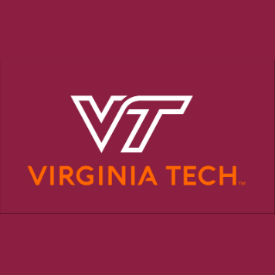
And to further support low- and middle-income families who seek a Virginia Tech education, the university announced its intent to allocate approximately $5 million in additional resources — the largest one-year increase in university history for the second year in a row — toward financial aid programs next year, raising the total institutional support for student financial aid to more than $55 million in 2019-20.
As part of the growth in financial aid, Virginia Tech will further enhance its Funds for the Future program next year. The program protects low- and middle-income students from rising tuition and fees and helps families plan for the cost of education over four years.
Beginning this fall, the program will provide 100 percent protection from tuition and fee increases for returning students with a family income of up to $100,000, up from $80,000 this year. In addition, the university’s Presidential Scholarship Program will provide full four-year scholarships to 85 incoming resident students next year, growing the total enrollment in the program to more than 330 students.
“We understand the concerns students and families feel when considering how to pay for a college education and it is essential that we do all we can to address those concerns,” said Virginia Tech Board of Visitors Rector Dennis Treacy. “With additional funding from the General Assembly, we were able to hold the line on tuition for resident undergraduate students.”
Including university-funded support, Virginia Tech undergraduates received approximately $215.6 million in grant aid and scholarship support last fiscal year.
Earlier this spring, the Virginia General Assembly approved the 2019 In-state Undergraduate Affordability Initiative, which designated $52.5 million in state funding for public universities that voluntarily “maintain tuition and mandatory Educational and General (E&G) fee charges for in-state undergraduate students to fiscal year 2019 levels.” By choosing to participate in this program, Virginia Tech will receive an additional $6.3 million in state funding to support educational programs next year, pending approval from Gov. Ralph Northam.
“Increased state support truly benefits Virginia families and strengthens our land-grant mission to provide access to higher education at a time when costs are increasing and demand for a Virginia Tech degree continues to grow,” added Virginia Tech President Tim Sands. “It reinforces our ongoing commitment to improve academic quality while making our university accessible to all Virginia students who qualify.”
E&G fees, or fees that support library and technology services for students, also will not increase in 2019-20. At Virginia Tech, these fees for resident undergraduate students total $175, and the E&G fees for out-of-state undergraduate students total $779 (includes a state-assigned out-of-state student capital fee).
The comprehensive fee, which supports auxiliary operations, including health services, recreation sports, student activities, transit system, intercollegiate athletics, and career services, is paid by all undergraduate and graduate students enrolled on the Blacksburg campus. The comprehensive fee will increase by $71, bringing the comprehensive fee total to $2,096, the lowest of all 15 public universities in the state.
Next year, the total cost of tuition and all mandatory fees for resident undergraduate students will be $13,691, increasing only by the $71 change in the comprehensive fee. The total cost of tuition and all mandatory fees for out-of-state undergraduate students will increase by 2.9 percent, or $927 per year, to a total of $32,835 annually.
On average, room and board charges for both resident and nonresident undergraduate students will increase next year by 4.6 percent, or $408 per year, to a total of $9,342 annually.
When adding tuition and mandatory fees with average room and board, the total cost in 2019-20 for a Virginia undergraduate student living on campus will be $23,033. Out-of-state undergraduate students living on campus will pay $42,177.
In addition, differential program fees used in select academic programs to offset higher instructional costs, ensure continued academic program quality, maintain advanced technology, and expand enrollment opportunities in these high-demand programs will not increase next year.
Virginia Tech will continue to discount undergraduate tuition by 10 percent during the summer session and winter session courses to help students complete degrees at an accelerated pace during nontraditional times.
In 2019-20, tuition and mandatory fees for resident graduate students will increase $462 to $15,972. Tuition and mandatory fees for out-of-state graduate students will increase $860 to $30,489.
The total annual cost to Virginia and Maryland veterinary students will be $25,377, an increase of $605 or 2.4 percent. Out-of-state veterinary students will pay $54,510, an increase of $1,205 or 2.3 percent.
Students enrolling at the Virginia Tech Carilion School of Medicine this summer will pay a total annual cost $54,056, an increase of $1,311 or 2.5 percent.
Tuition and fees are the primary source of revenue supporting the university’s E&G budget. In the current fiscal year, for example, tuition and fees from both in-state and out-of-state students account for $552.4 million (or 72.5 percent) of the $762.0 million total E&G budget. The state provides $164.4 million (or 21.6 percent) toward the E&G budget, and an additional $45.1 million (or 5.9 percent) comes from other sources.
This year marks the second consecutive year, and only the second time in university history, that more than 30,000 students applied to Virginia Tech. The university received its most diverse pool of applicants ever that more closely reflects the composition of the commonwealth.
Regular admissions decisions were sent to prospective students last month. Students who were offered spots in the Class of 2023 have a strong academic profile, with an average grade point average of 4.10 and average SAT score of 1320. The university intends to enroll 6,600 incoming first-year students this fall, a 400-seat increase from last year’s class.










